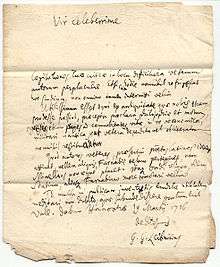Definify.com
Webster 1913 Edition
Letter
Let′ter
(lĕt′tẽr)
, Noun.
[From
Let
to permit.] One who lets or permits; one who lets anything for hire.
Let′ter
,Noun.
[OE.
lettre
, F. lettre
, OF. letre
, fr. L. littera
, litera
, a letter; pl., an epistle, a writing, literature, fr. linere
, litum
, to besmear, to spread or rub over; because one of the earliest modes of writing was by graving the characters upon tablets smeared over or covered with wax. Pliny, xiii. 11.
See Liniment
, and cf. Literal
.] 1.
A mark or character used as the representative of a sound, or of an articulation of the human organs of speech; a first element of written language.
And a superscription also was written over him in
letters
of Greek, and Latin, and Hebrew. Luke xxiii. 38.
2.
A written or printed communication; a message expressed in intelligible characters on something adapted to conveyance, as paper, parchment, etc.; an epistle.
The style of
letters
ought to be free, easy, and natural. Walsh.
3.
A writing; an inscription.
[Obs.]
None could expound what this
letter
meant. Chaucer.
4.
Verbal expression; literal statement or meaning; exact signification or requirement.
We must observe the
letter
of the law, without doing violence to the reason of the law and the intention of the lawgiver. Jer. Taylor.
I broke the
letter
of it to keep the sense. Tennyson.
5.
(Print.)
A single type; type, collectively; a style of type.
Under these buildings . . . was the king’s printing house, and that famous
letter
so much esteemed. Evelyn.
6.
pl.
Learning; erudition;
as, a man of
. letters
7.
pl.
A letter; an epistle.
[Obs.]
Chaucer.
Dead letter
, Drop letter
Letter book
, a book in which copies of letters are kept.
– Letter box
, a box for the reception of letters to be mailed or delivered.
– Letter carrier
, a person who carries letters; a postman; specif., an officer of the post office who carries letters to the persons to whom they are addressed, and collects letters to be mailed.
– Letter cutter
, one who engraves letters or letter punches.
– Letter lock
, a lock that can not be opened when fastened, unless certain movable lettered rings or disks forming a part of it are in such a position (indicated by a particular combination of the letters) as to permit the bolt to be withdrawn.
Letter paper
, paper for writing letters on; especially, a size of paper intermediate between note paper and foolscap. See
– Paper
. Letter punch
, a steel punch with a letter engraved on the end, used in making the matrices for type.
– Letters of administration
(Law)
, the instrument by which an administrator or administratrix is authorized to administer the goods and estate of a deceased person.
– Letter of attorney
, Letter of credit
Letter of license
, a paper by which creditors extend a debtor's time for paying his debts.
– Letters close
or
Letters clause
(Eng. Law.)
, letters or writs directed to particular persons for particular purposes, and hence closed or sealed on the outside; – distinguished from
letters patent
. Burrill.
– Letters of orders
(Eccl.)
, a document duly signed and sealed, by which a bishop makes it known that he has regularly ordained a certain person as priest, deacon, etc.
– Letters patent
, Letters overt
, or
Letters open
(Eng. Law)
, a writing executed and sealed, by which power and authority are granted to a person to do some act, or enjoy some right;
– as,
. The common commercial letters patent
under the seal of Englandpatent
is a derivative form of such a right. Letter-sheet envelope
, a stamped sheet of letter paper issued by the government, prepared to be folded and sealed for transmission by mail without an envelope.
– Letters testamentary
(Law)
, an instrument granted by the proper officer to an executor after probate of a will, authorizing him to act as executor.
– Letter writer
. (a)
One who writes letters.
(b)
A machine for copying letters.
(c)
A book giving directions and forms for the writing of letters.
Let′ter
(lĕt′tẽr)
, Verb.
T.
[
imp. & p. p.
Lettered
(-tẽrd)
; p. pr. & vb. n.
Lettering
.] To impress with letters; to mark with letters or words;
as, a book gilt and
. lettered
Webster 1828 Edition
Letter
LET'TER
,Noun.
1.
One who permits.2.
One who retards or hinders.3.
One who gives vent; as a blood-letter.LET'TER
,Noun.
1.
A mark or character, written, printed, engraved or painted; used as the representative of a sound, or of an articulation of the human organs of speech. By sounds, and articulations or closures of the organs, are formed syllables and words. Hence a letter is the first element of written language, as a simple sound is the first element of spoken language or speech. As sounds are audible and communicate ideas to others by the ear, so letters are visible representatives of sounds, and communicate the thoughts of others by means of the eye.2.
A written or printed message; an epistle; a communication made by visible characters from one person to another at a distance.The style of letters ought to be free, easy and natural.
3.
The verbal expression; the literal meaning.We must observe the letter of the law, without doing violence to the reason of the law, and the intentions of the lawgiver.
4.
Type; a charter formed of metal or wood, usually of metal, and used in printing books.5.
Letters, in the plural, learning; erudition; as a man of letters.Dead letter, a writing or precept, which is without authority or force. The best law may become a dead letter.
Letter of attorney, a writing by which one person authorizes another to act in his stead.
Letter of marque, a private ship commissioned or authorized by a government to make reprisals on the ships of another state. [See Marque.]
Letters patent, or overt, open, a writing executed and sealed, by which power and authority are granted to a person to do some act, or enjoy some right; as letters patent under the seal of England.
LET'TER
,Verb.
T.
Definition 2026
Letter
Letter
See also: letter
German
Noun
Letter f (genitive Letter, plural Lettern)
- a letter (character)
- a type in typesetting
- der Buchdruck mit beweglichen Lettern
- large or decorated letter as used for book covers, headlines, signs, and inscriptions
- An der Tür prangte in goldenen Lettern sein Name.
Synonyms
- letter (character): Buchstabe
- Litera, Litter (maybe dated)
- Druckbuchstabe, Druckletter, Drucktype, Type
References
- Digitales Wörterbuch der deutschen Sprache (DWDS)
- Johann Christoph Adelung: Grammatisch-kritisches Wörterbuch der Hochdeutschen Mundart, Band 2. Leipzig, 1796, S.2035, Stichwort Letter. (bei woerterbuchnetz.de, bei zeno.org)
- Letter in Duden online
letter
letter
See also: Letter
English

letters (1)

a letter (2)
Pronunciation
- (Received Pronunciation) IPA(key): /ˈlɛtə(ɹ)/
- (Australia) IPA(key): /ˈletə(ɹ)/, [ˈleɾə(ɹ)]
- (General American) IPA(key): /ˈlɛtɚ/, [ˈlɛɾɚ]
- Rhymes: -ɛtə(r)
- Hyphenation: let‧ter
Noun
letter (plural letters)
- A symbol in an alphabet.
- There are twenty-six letters in the English alphabet.
- Bible, Luke xxiii. 38
- And a superscription also was written over him in letters of Greek, and Latin, and Hebrew.
- A written or printed communication, generally longer and more formal than a note.
- I wrote a letter to my sister about my life.
- (Can we date this quote?), William Walsh, (Please provide the title of the work):
- The style of letters ought to be free, easy, and natural.
- 1922, Ben Travers, chapter 1, in A Cuckoo in the Nest:
- He read the letter aloud. Sophia listened with the studied air of one for whom, even in these days, a title possessed some surreptitious allurement.
- 1977, Agatha Christie, An Autobiography, Part I, chapter4:
- An indulgent playmate, Grannie would lay aside the long scratchy-looking letter she was writing (heavily crossed ‘to save notepaper’) and enter into the delightful pastime of ‘a chicken from Mr Whiteley's’.
- The literal meaning of something, as distinguished from its intended and remoter meaning (often contrasted with the spirit).
- (Can we date this quote?), Jeremy Taylor, (Please provide the title of the work):
- We must observe the letter of the law, without doing violence to the reason of the law and the intention of the lawgiver.
- (Can we date this quote?), Tennyson, (Please provide the title of the work):
- I broke the letter of it to keep the sense.
-
- (plural) Literature.
- Benjamin Franklin was multiskilled - a scientist, politician and a man of letters.
- (US, uncountable) A size of paper, 8½ in × 11 in (215.9 mm × 279.4 mm, US paper sizes rounded to the nearest 5 mm).
- (Canada, uncountable) A size of paper, 215 mm × 280 mm.
- (US, scholastic) Short for varsity letter.
- (printing, dated) A single type; type, collectively; a style of type.
- (Can we date this quote?), John Evelyn, (Please provide the title of the work):
- Under these buildings […] was the king's printing house, and that famous letter so much esteemed.
-
Quotations
- For usage examples of this term, see Citations:letter.
Synonyms
Hyponyms
Derived terms
Terms derived from the noun letter
|
|
|
Related terms
Terms etymologically related to letter
Translations
letter of the alphabet
|
|
written message
|
|
Verb
letter (third-person singular simple present letters, present participle lettering, simple past and past participle lettered)
- (transitive) to print, inscribe, or paint letters on something.
- (intransitive, US, scholastic) To earn a varsity letter (award).
Etymology 2
Noun
letter (plural letters)
- One who lets, or lets out.
- the letter of a room
- a blood-letter
- (archaic) One who retards or hinders.
Statistics
Most common English words before 1923: alone · body · point · #346: letter · become · became · second
Dutch
Pronunciation
Noun
letter f (plural letters or letteren, diminutive lettertje n)
- letter (letter of the alphabet)
Derived terms
Terms derived from letter
|
|
|